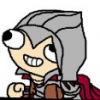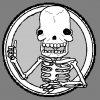One obvious thing is that you take the role you love.
[quote name='KingNothing33' timestamp='1358265082' post='5021824']
love designing game levels and stuff
[/quote]
Designer and Artist are two very different positions. Let me know if our vocabulary is different here:
Artist (Assuming Graphic Artist) - someone who is working on images to use in the game. often this will also be a 3D Modeller, musician and other art requirements. They might be the ones who set the tone of how the game looks, and share with the programmer as to how the game feels to play.
Level Designer - someone who looks at the skills and abilities that the player has, and introduces them in gradual ways to the player, so they become well versed in it. suppose you have shooting as a standard, but you also have a grappling hook. The first levels will just be target practice, then moving targets, then popup targets. After that, they are given or find the grappling hook. In a safe way, where if they fail, it brings them right back to try again, they try the grappling hook. Then shortly after, are presented with another need to use it, but this time if the fall/fail, it will hurt or worse. next, they are presented with needing to shoot one monster while still on the grappling hook. - The Level Designer is responsible for making sure these features and ideas are being presented to the player in a fun and effective manner. - you can start right away too. if you know the general idea of the game, and some of the types of monsters/weapons, etc... you can start designing out the first few levels.
Story Designer - Establishes a plot, particularly requiring engagement for the style of game play provided. They will work with the Level Designer to make sure that each level is either progressing the story, or working with it. A game designer will usually write in episodes, splitting the story into sections that play out certain modes of game play and focus that works with the features of the game.
System Designer - when outside of the game play portion of the game, this designer takes over on the look/operations. I.e. this might be for a level editing tool, or a character editor, or even menus. This person designs the flow and processes that the user will go through.
UI Designer - This person designs the look and feel of HUD's, and menus. Not necessarily the flow, though it can be. But what do the menus look like, what borders and placement are used for the in-game on-screen controls, etc...
The point here is not for vocabulary, but to point out that there is a LOT of design work that goes into a game, and you might have a full time job just with that.
However, a happy medium might also be to create a task list with your friends. I presume they have a general idea of your abilities, and how it relates to what they do. Ask them to come up with a list of tasks that need to be done (good for a team anyway), at least the things that can be reasonably worked on now. And mark off things they think you could take on with little help. Or better yet, ask them to come up with a few tasks that you might not use in the game, but will help get you to a more useful need soon.
These kinds of task often relate to busy work, such as learning SQL, so you can pre-populate NPC stats. This could be learning to do some basic event coding, so you can start tying events from AI, or NPC's into the main game engine. Its especially helpful if one of the others can figure out what kinds of things the expect to be more common, so they can focus you training on that.
Another thing I often like to institute in game teams of mine, is a Master/Apprentice mentality. A lot of other trades have it, but Programming doesn't formally carry those titles, at least not in the same way. everyone on the team knows that the apprentices are still very much in a learning stage, and will typically be helpful to them. Essentially, you could work as Apprentice to them.









